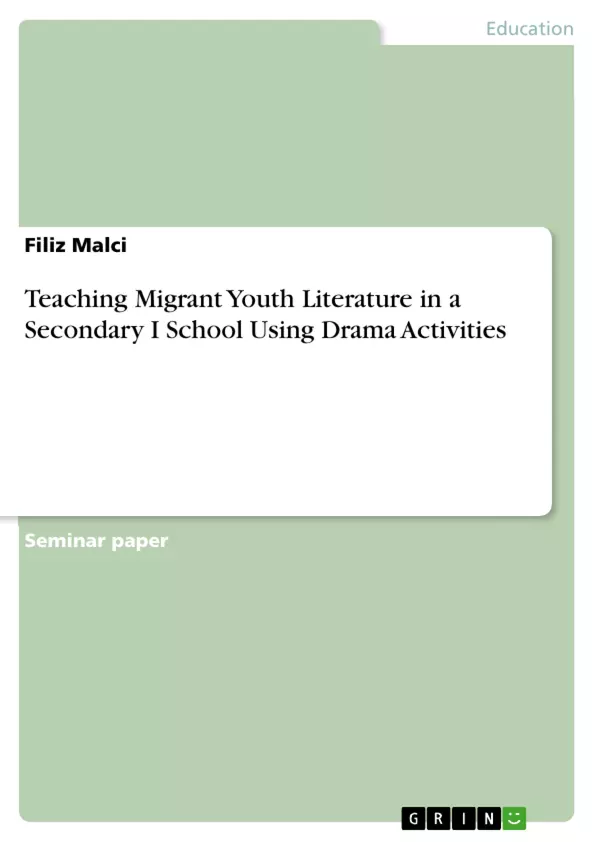The following term paper deals with teaching migrant youth literature in a foreign English language classroom by using drama strategies in a 10th grade of a secondary I school. The second chapter of this term paper analyzes the term literature and defines its subgenres novel and young adult literature. Referring to that, the second chapter concludes with the analysis and description of migrant youth literature since it is fundamental for this term paper.
The third chapter explains the importance of teaching literature in a foreign English language classroom by using drama strategies with the focus on migrant youth literature. For this purpose, the novel "Be Strong, My Abela" is taken into consideration for teaching a 10th grade of a secondary I school in migrant youth literature. The term paper ends with a conclusion about the necessity of teaching migrant youth literature in a foreign English language classroom.
The process of migration is an intensely personal experience. It seems easy for societies who live in peace and are well-off to judge people who migrate to the countries they live in. However, no one knows how painful it feels to leave a place that home for years. Literature is a cultural artifact that enables readers to cross borders. Migrant youth literature offers students the possibility to have an insight across the borders that are constructed by society. Besides that, migrant youth literature offers an intercultural and multilingual map of the world that redraws boundaries by building bridges between people.
Inhaltsverzeichnis (Table of Contents)
- Introduction
- The Definition of Literature
- The Novel - a form of Literature
- Young Adult Literature - a subgenera of the Novel
- Migrant Youth Literature - a form of Young Adult Literature
- The importance of teaching Literature in a Foreign English Language Classroom
- Teaching migrant youth literature in a foreign English language classroom
- Teaching "Be Strong, My Abela” in a 10th grade of a secondary I school as an example of migrant youth literature
- Conclusion
Zielsetzung und Themenschwerpunkte (Objectives and Key Themes)
This term paper focuses on the importance of teaching migrant youth literature in a foreign English language classroom using drama strategies. It analyzes the term "literature" and its subgenres, focusing on the novel and young adult literature, leading to an analysis and description of migrant youth literature. The paper then explores the benefits of teaching literature in a foreign English language classroom, particularly migrant youth literature, using "Be Strong, My Abela” as an example for a 10th grade of a secondary I school. The paper concludes by emphasizing the necessity of teaching migrant youth literature in such contexts.
- The definition and characteristics of migrant youth literature
- The importance of teaching literature in foreign language classrooms
- The role of drama strategies in teaching migrant youth literature
- The use of "Be Strong, My Abela” as an example for teaching migrant youth literature in a secondary I school
- The necessity of teaching migrant youth literature in a foreign English language classroom
Zusammenfassung der Kapitel (Chapter Summaries)
The first chapter introduces the concept of migration as a personal experience and highlights the significance of literature in enabling readers to cross cultural boundaries. It emphasizes the importance of migrant youth literature in providing insights into the lives of migrant youth and offering an intercultural and multilingual map of the world. The second chapter delves into the definition of literature, exploring its evolution from an oral tradition to a written form. It discusses the difficulty in defining literature precisely and presents Terry Eagleton's view of literature as a constantly changing and evolving concept. The chapter also introduces the concept of genre and categorizes literature into six categories, focusing on the genre of prose, specifically novels, as the central focus of this term paper.
The third chapter examines the novel as a form of literature belonging to the genre of prose, defining its major features. It explains the concept of fiction, its categories, and the importance of realistic fiction in reflecting social reality. The chapter then analyzes the essential literary elements of a novel, including the story, plot, setting, characters, theme, writer's style and technique, and voice. Each element is discussed in detail, emphasizing their importance in understanding and analyzing a novel.
Schlüsselwörter (Keywords)
The primary keywords and focus topics of this text include migrant youth literature, foreign English language classroom, drama strategies, novel, young adult literature, genre, realistic fiction, and literary elements.
Frequently Asked Questions
What is migrant youth literature?
Migrant youth literature is a subgenre of young adult literature that focuses on the personal and social experiences of migration, often helping students build intercultural bridges.
How can drama activities be used in the English classroom?
Drama strategies allow students to physically and emotionally engage with literary characters, enhancing their understanding of complex themes like identity and belonging.
Which novel is used as an example in this paper?
The novel "Be Strong, My Abela" is analyzed as a teaching example for a 10th-grade secondary school class.
Why is it important to teach literature in foreign language classrooms?
Teaching literature fosters intercultural competence, language acquisition, and the ability to view the world from different perspectives.
What are the essential literary elements of a novel according to the text?
The text lists story, plot, setting, characters, theme, style, and voice as essential elements for literary analysis.
- Quote paper
- Filiz Malci (Author), 2019, Teaching Migrant Youth Literature in a Secondary I School Using Drama Activities, Munich, GRIN Verlag, https://www.grin.com/document/587989



